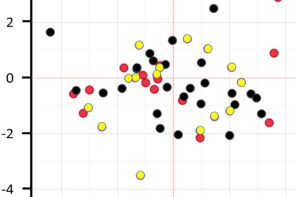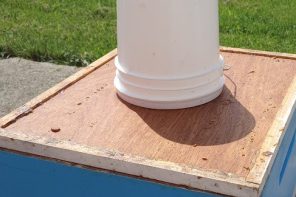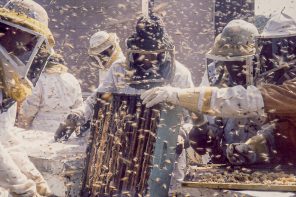By: John Miller
Our experience, as individuals and in societies, is informed by history. ‘Nothing new under the sun’, we’ve often heard. Many observers now reference the Cuban Missile Crisis of 1962 with the current situation in Ukraine. How Nikita Khrushchev, with bombast and bluster – painted himself into a rhetorical corner from which he could not escape (in today’s parlance it’s called an off-ramp) without a humiliating loss. Within two years, Khrushchev was deposed.
Meanwhile, a little closer to home, American beekeepers are on the verge of repeating, or learning from history. Tropilaelaps mercedesae (Tropi) is an ectoparasitic mite expanding its range.
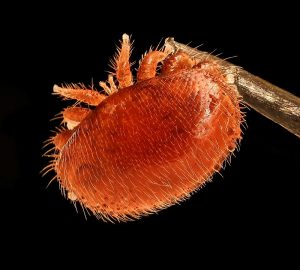
Varroa
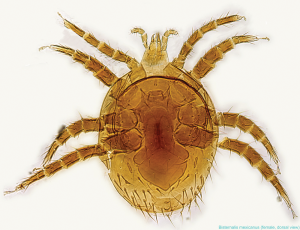
Tropilaelaps
Similar to the range expansion Varroa destructor took 40 years ago. Beekeepers large and small have fought to control Varroa globally – ever since. The range expansion of Varroa is now mirrored in a weirdly eerie similar pattern. It’s coming. We are so very unprepared.
An internet search will come up with a presentation by Dr. Sammy Ramsey.
Everyone who grows food, or likes to eat food, should watch Tropilaelaps presentations.
I cannot think of a similar moment in American beekeeping history. Call me an alarmist.
I think we are at an inflection point. Remember a decade ago when President Obama called for an ‘All Hands On Deck’ effort to do something with and for honey bees? More forage, better science, a beehive at the White House! Consider a similar effort in 2023; only this time – the effort comes from the beekeepers. It will require working together – an idea for beekeepers to grasp – but we can do it.
https://doi.org/10.1093/gigascience/gix008 describes the Draft genome of the honey bee ectoparasitic mite.
Taking the fight to Tropi will be expensive. Taking the fight to Tropi will cost a fraction of the cost of battling Tropi once she arrives stateside. My children and grandchildren should not have to fight Tropi the way I stupidly fought Varroa.
We’re going to need some cash. A bunch of it. We’re going to need to coordinate and collaborate. We need many sets of eyes on this bug. Geneticists to probe for weaknesses in Tropi – a vulnerability. Chemists – experts who know how difficult it is to kill a bug on a bug.
Molecular biologists with the skills to train available instruments on the target. Entomologists trained in parasites of other insects. Multiple disciplines needed.
Lots of money needed.
Right now, in California and North Dakota – state tax revenue is robust. California has perfected the Kleptocracy form of government. Big tax surplus in California. North Dakota enjoys a robust energy sector, and an equally robust extraction taxation scheme. Lots of money in lots of buckets in CA/ND. CA & ND in American beekeeping – they’re siamese twins. CA can’t do without ND bees. CA bees need somewhere to go after Spring – to ND. ND used to be the last, best place. It’s now the least, worst place. Disclosure: I am the President of the North Dakota Beekeepers Association. Our ND Honey Promotion Fund has money in it – looking for a good Tropi project. ND is a leading State organization funding bee research. Buzz Landon is President of CA State Beekeepers Association. CA is a leading State group funding bee research.
Idaho is a solid funder of bee research. Oregon beekeepers fund bee research. If the top ten State bee research funding groups ever shared a common challenge: Tropi is it. For the first time in history: State Groups: please talk with each other!
A coordinated approach with California Department of Food and Agriculture Secretary Karen Ross should help. Ag Association Management Services (AAMSI) represents CA State Beekeepers Association. Chris Zanobini leads AAMSI. He is a wise man.
We need not be hysterical. Simply factual is hysterical enough with Tropi.
The notoriously frugal North Dakota Legislature meets in January. ND is rightfully proud of the fact that ND is the #1 honey production state – by about a solar system – in America.
A coordinated approach to ND Legislature should help. Maybe it’s a grant – administered by NDSU in Fargo. ND has a pretty good Ag Genome Center in Fargo.
In November, Senator John Hoeven (R) was re-elected to the U.S. Senate. Control of the Senate will soon change; and John Hoeven will write portions of the 2023 Farm Bill. A coordinated approach to funding bee research – sufficient funding to take the fight to Tropi in Thailand – as a preventative measure – is a sound expenditure of taxpayer money. If you think food is expensive now; wait.
Another way for beekeepers to help beekeepers is to support ‘temporary refrigerated beehive storage’ as an allowed use in the Farm Stored Facility Loan Program (FSFLP). In 2018, Senator Hoeven supported the expanded use of the FSFLP. USDA ignored the request to expand the eligible uses of FSFLP: https://www.fsa.usda.gov/Assets/USDA-FSA-Public/usdafiles/FactSheets/2022/farm_storage_facility_loan_programs_fact_sheet_july_2022.pdf
American beekeepers can place beehives in refrigerated buildings to control Varroa through a brood break, made possible by placing hives into a cold, quiet, dark space for several months – creating brood-free conditions in beehives. This method of mite control may be one of perhaps very few controls for Tropi. Construction costs for indoor buildings can be $150/psf. Correct: a 20,000 square foot building; capacity: 20,000 hives; may cost $3,000,000 to build. Cost of funds are shown in the FSFLP fact sheet. Interest rates in the FSFLP are lower than any other lender. Beekeepers should have access to this assistance.
The Animal and Plant Health Inspection Service is tasked with protecting our shores from bad bugs and bad plants. The ports serving ocean-going vessels are a prime target for species expanding their global range. If there is a potentially more devastating bug out there than Tropi – I want to read about it. Trap lines of pheromone lure pots should be invigorated.
The value of the best beekeeping outfits in America will be halved the day after Tropi is found in America. That’s one estimate.
The Apiary Inspectors of America: Beekeepers and the Inspectors should be speaking with each other. Call me an alarmist; but I sincerely believe we, all of us, could work together on Tropi.
The Office of the Chief Scientist, USDA evaluates the best of emerging science, established science – and where best to apply that science – to control agricultural threats. There is a little money appropriated for USDA-OCS; and more should be appropriated in the 2023 Farm Bill.
You know who else has a powerful voice? Hobbyists. Home production beekeepers. Beekeepers in all 50 states have an opportunity to speak out in support of bee research funding. Not a one-n-done one year and then on to the next shiny thing. This one is real.
Consider spending $20 million a year for three years to prevent a parasite that will cost $100 million a year forever… like Varroa; only worse.
The 35-year experience with Varroa has been miserable. It’s still miserable. Millions of hives perish every year from Varroa. Beekeepers don’t have to go through the same experience with Tropi. To prevent history from repeating, we must differently approach the challenge. In 2022, Australian beehives found to be infested with Varroa are being burned. History knows how that will turn out. Prevention > Redemption.






